
Richard Dix was an American motion picture actor who achieved popularity in both silent and sound film. His standard on-screen image was that of the rugged and stalwart hero. He was nominated for the Academy Award for Best Actor for his lead role in the Best Picture-winning epic Cimarron (1931).

Constance Campbell Bennett was an American stage, film, radio, and television actress and producer. She was a major Hollywood star during the 1920s and 1930s; during the early 1930s, she was the highest-paid actress in Hollywood. Bennett frequently played society women, focusing on melodramas in the early 1930s and then taking more comedic roles in the late 1930s and 1940s. She is best remembered for her leading roles in What Price Hollywood? (1932), Bed of Roses (1933), Topper (1937), Topper Takes a Trip (1938), and had a prominent supporting role in Greta Garbo's last film, Two-Faced Woman (1941).

Wheeler & Woolsey were an American vaudeville comedy double act who performed together in comedy films from the late 1920s. The team comprised Bert Wheeler (1895–1968) of New Jersey and Robert Woolsey (1888–1938) of Illinois.
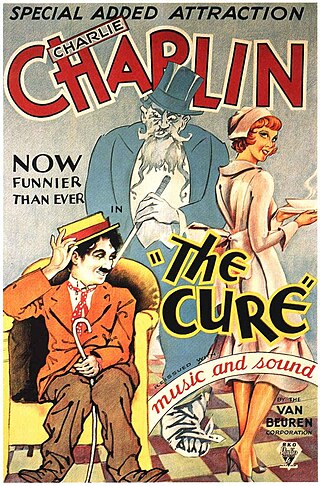
The Cure is a 1917 short comedy film written and directed by Charlie Chaplin. The plot revolves around alcohol, being made just prior to prohibition but during a period where the politicians were debating the evils of alcohol.

Hit the Ice is a 1943 film starring the comedy team of Abbott and Costello and their first film directed by Charles Lamont. Lamont later directed the team's last few films in the 1950s.
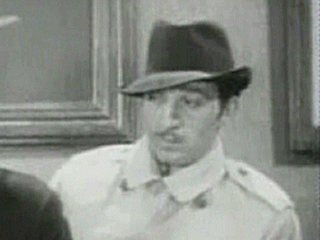
The Stolen Jools is a 1931 American pre-Code comedy short produced by the Masquers Club of Hollywood, featuring many cameo appearances by film stars of the day. The stars appeared in the film, distributed by Paramount Pictures, to raise funds for the National Vaudeville Artists Tuberculosis Sanitarium. The UCLA Film and Television Archive entry for this film says—as do the credits—that the film was co-sponsored by Chesterfield cigarettes to support the "fine work" of the NVA sanitarium.

William Edward "Bud" Jamison was an American film actor. He appeared in 450 films between 1915 and 1944, notably appearing in many shorts with The Three Stooges as a foil.
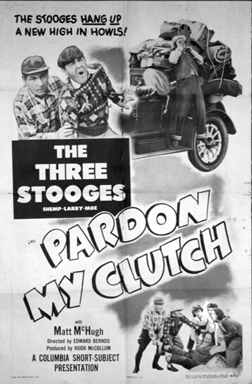
Pardon My Clutch is a 1948 short subject directed by Edward Bernds starring American slapstick comedy team The Three Stooges. It is the 105th entry in the series released by Columbia Pictures starring the comedians, who released 190 shorts for the studio between 1934 and 1959.
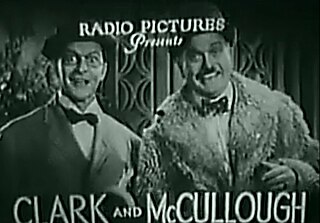
Robert Edwin Clark, known as Bobby Clark, was an American minstrel, vaudevillian, performer on stage, film, television and the circus. Known for his painted-on eyeglasses, he was part of a comedy team with Paul McCullough for 36 years.

Paul Johnston McCullough was an American actor and comedian who was one half of the comedy duo Clark and McCullough, along with fellow comedian Bobby Clark.

Clark and McCullough were a comedy team consisting of comedians Bobby Clark and Paul McCullough. They starred in a series of short films during the 1920s and 1930s. Bobby Clark was the fast-talking wisecracker with painted-on eyeglasses; Paul McCullough was his easygoing assistant named Blodgett.
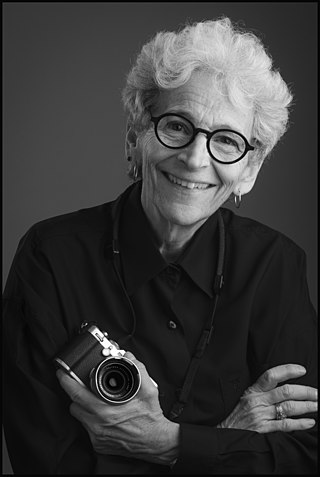
Penny Wolin, also known as Penny Diane Wolin and Penny Wolin-Semple, is an American portrait photographer and a visual anthropologist. She has exhibited solo at the Smithsonian Institution and is the recipient of two grants from the National Endowment for the Humanities and one grant from the National Endowment for the Arts. Her work is held in the permanent collections of such institutions as Harvard University, the Layton Art Collection at the Milwaukee Art Museum, the Santa Barbara Museum of Art, the New York Public Library and the Smithsonian American Art Museum. Known for her documentary and conceptual photographs, she has completed commissions for major corporations, national magazines and private collectors, including the Walt Disney Company, LIFE Magazine and the Brant Foundation. For over 30 years, she has used photographic portraiture with oral interviews to research Jewish civilization in America.

Bowery Bombshell is a 1946 American comedy film directed by Phil Karlson and starring the comedy team of The Bowery Boys. It is the third film in the series and was distributed by Monogram Pictures.

Kickin' the Crown Around is a 1933 American Pre-Code film featuring the comedy team Clark and McCullough and directed by Sam White.

The Gay Nighties is a 1933 American pre-Code comedy film featuring Clark & McCullough and directed by Mark Sandrich.

Too Many Wives is a 1937 American comedy film directed by Ben Holmes and starring Anne Shirley, Gene Lockhart and Barbara Pepper. Produced and distributed by RKO Pictures, it lost $35,000.

Ladies' Day is a 1943 American comedy film directed by Leslie Goodwins and written by Charles E. Roberts and Dane Lussier, adapted from the play of the same name. The film stars Lupe Vélez, Eddie Albert, Patsy Kelly, Max Baer and Jerome Cowan. It was released on April 9, 1943, by RKO Pictures.
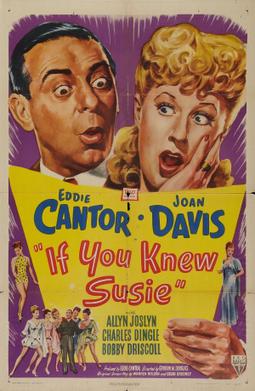
If You Knew Susie is a 1948 American comedy film directed by Gordon Douglas and written by Warren Wilson, Oscar Brodney, Bud Pearson and Lester A. White. The film was produced by, and starred, Eddie Cantor in his final starring role in a feature film. The film also stars Joan Davis, Allyn Joslyn, Charles Dingle and Bobby Driscoll. The film was released on February 7, 1948, by RKO Pictures.

Frank Redman was an American cinematographer from the end of the silent era through the 1960s. During his almost 40-year career, he shot over 60 feature films, as well as several film shorts and serials. In the 1950s, he transitioned to the smaller screen, where he was most well known for his work on the iconic television show, Perry Mason from the end of the 1950s through 1965.
Alphonse Martell was a French actor who wrote and directed Gigolettes of Paris (1933). He portrayed a director in the 1934 film I'll Be Suing You. He often portrayed a waiter as in the 1946 film Falcon's Alibi, in which he is murdered.

















